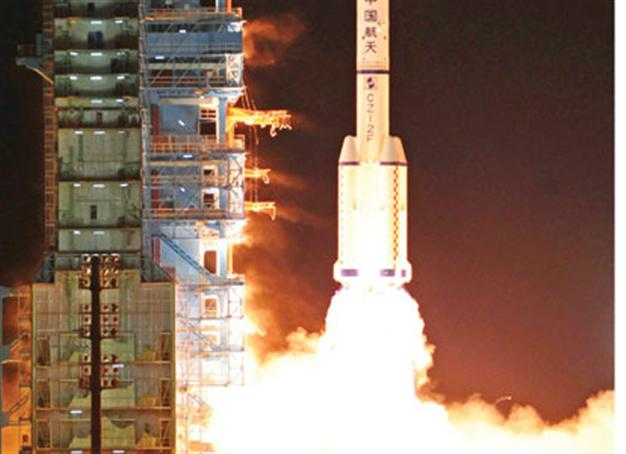China launches spacecraft, aims space station by 2020
BEIJING - Agence France-Presse

A modified model of the Long March CZ-2F rocket carrying the unmanned spacecraft Shenzhou 8 is seen in this photo. AP photo
China launched an unmanned spacecraft on yesterday to carry out a key docking mission, taking its next step towards the goal of building its first space station by 2020.
The Shenzhou VIII blasted off from the Gobi desert in China’s northwest before separating from its carrier rocket about 200 kilometers above the Earth, the state Xinhua news agency said.
It is due to join with the Tiangong-1 or “Heavenly Palace” experimental module in two days, in what would be the country’s first space docking -- a key step in China’s ambitious space program. The ability to dock successfully is crucial to the success of China’s plans to build a space station where astronauts can live for several months, as they do on the International Space Station. The technology is hard to master because the two vessels, placed in the same orbit and revolving around Earth at 28,000 kilometers per hour, must come together progressively to avoid destroying each other.
Space program global stature symbol for China
China sees its space program as a symbol of its global stature, growing technical expertise, and the Communist Party’s success in turning around the fortunes of the once poverty-stricken nation. It began its manned spaceflight program in 1990 after buying Russian technology and in 2003 became the third country to send humans into space, after the former Soviet Union and the United States. In September 2008, the Shenzhou VII, piloted by three astronauts, carried out China’s first space walk. The launch of Tiangong-1 on September 29 -- ahead of China’s National Day on October 1 -- was attended by Premier Wen Jiabao, while President Hu Jintao watched from a space flight control centre in Beijing.
But Beijing is playing catch-up in the space arena. The planned space docking will only emulate what the Americans and Russians achieved in the 1960s. The Global Times newspaper said the benefits of China’s investment in space technology were not yet clear, but that the country had “no choice” other than to pursue its exploration program. “As long as we are determined to rise in the world and pursue rejuvenation, we need to take risks. Otherwise China will be a nation with prosperity but subordinated to top powers,” it said in an editorial yesterday.
















